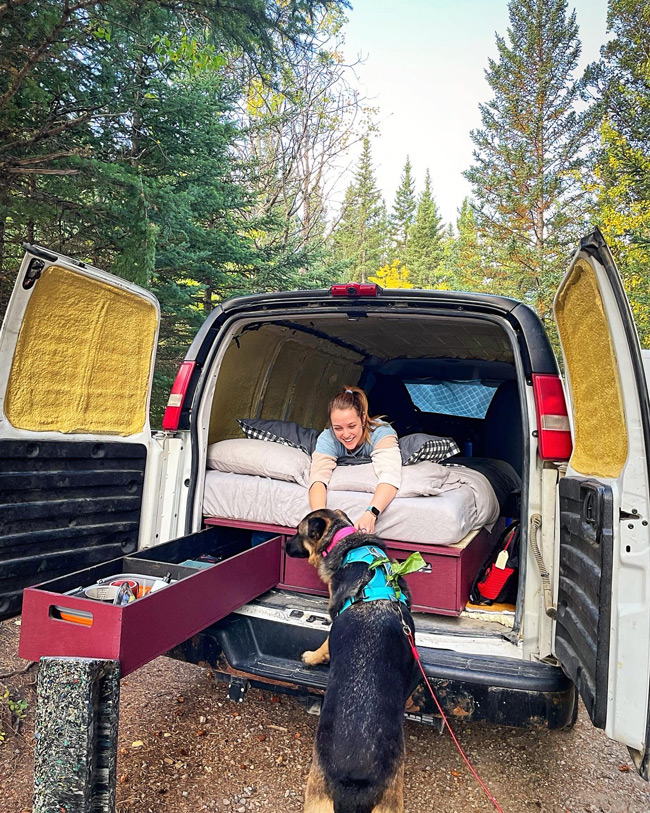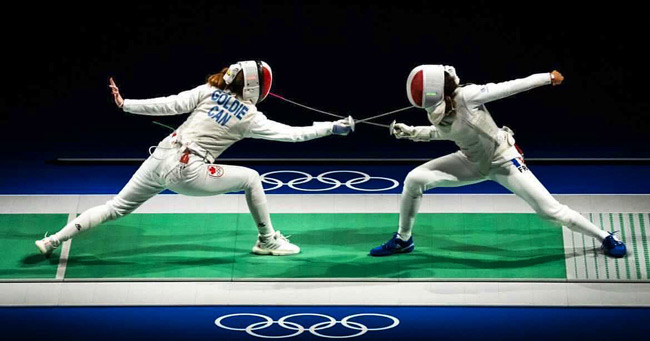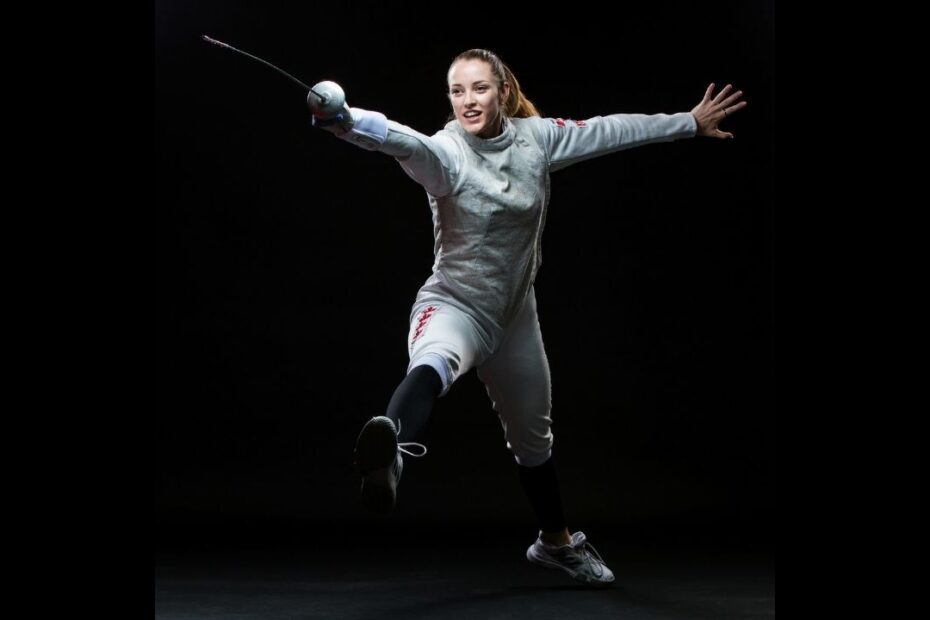Photos courtesy of the Goldie family, Dave Holland, and Michael Hall.
Well before she flipped open her laptop to scour Kijiji, well before she pulled out the tape measure, well before she powered up the tools, Alanna Goldie had plans.
For years, she envisioned a project just like this.
“I’ve always wanted to live the van life. Go travel around Canada in a van. Go camping and have this van,” said Goldie. “This wasn’t something I was just randomly deciding to do — it was something that I had been wanting for a long time.”
A month after returning from the 2020 Olympics in Tokyo — where she helped the women’s foil team post a best-ever finish — the Calgary fencer declared her intention.
To buy a cargo van and convert it into a camper.
All by herself.
Despite having never once cradled a saw in that money-maker of a right hand — which, in addition to its educated handling of a sword’s hilt, is occasionally used to paint works of art — she was keen to throw herself into a van’s top-to-bottom makeover.
“My family always knew I was into this,” said Goldie, a hiking and biking enthusiast. “So after the first ‘Are you sure you really want to do this?’ they all got on board.”
Not that it really mattered. Because this is one determined soul, someone unlikely to be deterred.
An online hunt led her to a Chevy Express — “A big boy,” she calls it — which, in its for-mer lives, had been part of an electrical company’s fleet and, later, used to haul around dirt bikes.
Assessing the potential of the plain window-less white rig, Goldie made her pitch. “I went to the guy, ‘OK, this is as much as I can pay you.’ He said, ‘I’ve got other offers, but it seems like you really want it, so it’s yours.'”
And now? “It’s filling up my garage is what it’s doing,” Goldie’s father Brad said with a laugh.
But the vehicle — dubbed Ed Sheervan — has a new hardwood floor. Plus a built-in bed. Plus a shelving unit. And it’s been completely insulated.
Every upgrade courtesy of Goldie.
“I’m determined not to get any outside help, other than my dad making sure I don’t cut my hands off,” the 27-year-old said. “The saw we have is pretty old. My mom and dad got it as a wedding present — and they’ve been married for 43 years. I was scared of using it. But all my fingers are intact, so we’re looking good so far.”
Chuckling, Dad confirms that her experience is limited — “Zero skill” — but expanding in a hurry.
“Like everything else, she picked it up, learned it, practised it, and does it herself now,” said Brad. “We know with Alanna — and all of our kids (Brita and Eric) — once their minds are made up, you either help them or you’re going to get run over.”
In addition to providing garage space and dusty tools, Brad has captured his daughter’s hands-on adventures, posting videos to YouTube. “You can see him hanging around in the background,” said Goldie, “yelling at me to do things right, because he’s terrified.”
The transformation is coming along nicely. Already she’s put the thing into camping action.
“It’s the best thing I’ve ever done,” said Goldie. “I’m very happy I bought it. It was a big cost, and now I can add to it whenever I have time, whenever I have money.”
For a big-time performer, a distraction like this is considered healthy.
Goldie returns to the World Cup circuit later this week when she competes in Paris. For fencers, the season may extend into June. So swinging hammers and cutting boards turned into a wonderful offseason release. “My escape is to go work on the van.”
Dad gets it. He served as the president of the Canadian Fencing Federation, 2012-18, finding time to win the provincial épée title (at the age of 46). His eldest daughter Brita is a five-time national champion.
He knows that sport at the elite level is a wringer.
“For most of these Olympic athletes, it’s a full-time job,” said Brad. “Your brain’s got to get out of that somehow … it’s getting away from everything and being in your own head.”
Even if it means wincing while your youngest child introduces herself to an array of power tools.
“She has no ability, let’s just say that,” said Brad, chuckling. “But, like most of the athletes you get to chat with, once their mind is locked on a target, there’s no getting in the way of it — it’s going to happen one way or another.
“If you’ve ever met Alanna, she’s a very, very stubborn girl. When she sets her mind on something, she goes after it.”

If Brad and his wife Jean had any doubt about their daughter’s willpower, it was removed at a climbing wall during a friend’s birthday party.
Goldie, only nine years old, could reach the top — well, almost. Nice try. No big deal. Parents then asked her to come down. So did instructors. She refused, clinging to holds for 15 minutes, till, after repeated attempts, she successfully scaled the wall.
“Moms came to us and said, ‘Oh my god, she’s the most tenacious girl we’ve ever seen,'” said Brad. “That was the moment when we thought, ‘There’s something different.’ All of her siblings have that competitive spirit. They’re all what my wife would call hyper-competitive. At that moment we were thinking, ‘She will not fail. She does not want to fail.'”
He pauses. “So when we put her in fencing it was a bit of a surprise that she was strug-gling.”
Which is another story. One day, years before, Jean noticed that the University of Calgary was offering fencing classes, so they enrolled Brita, then nine. She loved it — and excelled.
Soon Dad got involved. And then Eric.
Only two years old when all this started, Goldie begged her parents to let her try fencing, but she was too young. Exasperated, she’d strap on Brita’s gear and clomp around the house.
At the age of eight, she finally got her way.
And? “I absolutely hated it. I thought it was the dumbest sport,” said Goldie. “I thought in my little kid brain I was going to be just as good as my sister, which is ridiculous. I thought I’d be a lot better than I was. I got the crap beat out of me.”
She informed her father that she did not like fencing, that, in fact, she was done with the sport. He refused to let her off the hook.
“Like most kids who try a sport for the first time, particularly a more complicated sport, success wasn’t as natural as she thought it was going to be,” said Brad. “There was initial disappointment … the frustration of thinking she could dominate something without ever doing it before.”
What became evident soon enough was that Goldie, like most everyone else in the family, did have a knack.
Finding her footing, foil in hand, she began to rattle off victories.
Included on her list of victims was her mom, who’d taken an introductory fencing course. “One year at Christmas I bet her that if she could get one point on me, I’d do the dishes for the whole Christmas (break),” said Goldie, laughing. “She didn’t get the point and that was the end of her career.”
Competitive spirit aside, this was just a little girl, someone with no grand plans beyond her next match.
She had a vague notion that all the triumphs were leading to something — but exactly what, she did not know. So Goldie would show up, steamroll, move on. “In my head, it never really clicked. The next thing I knew I was on the national team.”
Which may sound like an oversimplification of her trajectory. But not by much.
Goldie, at 11, was tops in U15 foil in Western Canada. She was the Alberta U17 champion at 12, the same age at which she competed in the Canada Winter Games. “She was probably one of the first child prodigies that we had come through,” said her dad.
Along the way she significantly improved her lunge, making it long and powerful. “Some-thing she didn’t really have in her arsenal before,” said Brad. “Once that happened, noth-ing stood in her way.”
For instance, at the 2010 national championships, Goldie, 16, swept the foil titles — cadet (under 17), junior (under 20), senior (open).
It marked the first — and only — time that has happened.
“At that point it was just a given that the Olympics were within her realm,” said Brad. “It was an inevitability, not a target so much.”
Looking back, Goldie acknowledges that it was “pretty cool” to hold all three Canadian crowns. But back then her motivation was hardly complicated. “I hated losing,” she said. “I’d do anything to not lose.” Meaning that going from match to match, from win to win, was her lone focus.
Wearing blinkers was not necessarily a bad thing. Because, apparently, a youngster claim-ing the senior title did not thrill some of the national-team members.
“My ignorance almost helped me survive the sports world because some people aren’t as kind and welcoming as they probably should be,” said Goldie, named an Honoured Ath-lete in 2011 by the Calgary Booster Club and the City of Calgary. “But (the mentality of) just showing up and training, just showing up and competing … it kind of helped me.”
Graduating from high school, she enrolled at Carleton University in Ottawa. But out of the blue, Ohio State University, among other U.S. colleges, began to express a sincere interest.
“It wasn’t on my radar,” said Goldie. “I got super super lucky and I’m very thankful that fell into my lap.”
Lucky, too, was OSU — because the Canadian import did not disappoint. A first-team All-American all four years, Goldie captured three bronzes and a silver at national-championship showdowns.
“The NCAA was kind of my jam,” she said. “I did really well.”
Education taken care of — major in criminology and criminal justice, minor in communi-cations — her athletic checklist was full of ticks, too.
Trips to the Pan-Am Games — 2011, 2015, 2019 — winning medals all three times. For a decade, a familiar face at Pan-American and world championships.
So, naturally, the Olympic Games had been on her mind.
“If that’s the best,” Goldie said, “then I want to be there.”

What stands out to Goldie about the Tokyo experience was the resilience on display.
Yes, the Canadian women’s foil team may have dropped its opening appearance — to France, eventual silver medalists — a result that wiped out any podium hopes. But instead of sagging, Goldie & Co. bucked up against Hungary and Japan, winning both sets, to seal fifth spot, its best-ever showing.
“We really pulled together,” said Goldie. “We had this moment after we lost, ‘Oh, crap. What now?’ We sat down and said, ‘Our day’s not over. We still have more matches to fence. All we can do is be that team that shows up’ — and we were. We walked on the strip and I think the other teams could feel our confidence.”
Now, with fewer than a thousand days until the start of the 2024 Summer Games in Paris, Goldie needs to make a decision.
Another shot at the Olympics? Perhaps.
Her original plan? “Tokyo was going to be my last hurrah. I needed to get out of it to save my own sanity.”
She explains that her joy for fencing had been leached away by bullying at the national-team level. But that was before Goldie and some of her teammates decided to speak up. A couple of months prior to the Summer Games — following a SafeSport investigation — staff changes were made.
“Which, I think, was the best thing for our team. I found a renewed love for the sport. We have this awesome vibe now,” said Goldie. “So now I’m in this weird space — ‘Do I want to continue? Do I want to retire?’ — because things are really awesome with the setup we have here.
“So the way I’m approaching it is I’m going to do some World Cups, see how I feel, see how I feel travelling. If I’m still enjoying it, I’ll keep going. But if I lose that joy again I think my time is over.”
Because, as an world-class athlete, commitment needs to be embraced. No coasting permitted.
Weekly for Goldie, there are three days of weight-lifting at the Canadian Sport Institute Calgary facility at WinSport. Four days — for two to three hours a shot — of on-strip fencing. Additionally, one morning of speed/change of direction drills and, on Saturday, extra cardio work. Also, three private lessons are wedged in there.
The Olympic cycle’s four years is serious business, crammed with self-assessment. It is a true investment.
“Everything you do is revolving around this one goal,” Goldie said. “Every day (thinking), ‘How I can be better? How can I be better? How can I be better?’ Your body can’t do that forever. Your brain can’t do that forever. It’s very emotional and taxing.”
When the athletic swan song does arrive, Goldie isn’t likely to draw a blank. Her horizons are broad — and broadening.
She coaches at the Epic Fencing Club, runs classes at the University of Calgary. There’s her artwork (etsy.com/shop/PaintingsByLanna).
Too, she’s working through the application process to join the Calgary Police Service. “That was always my dream — to be a police officer.”
In recent months, when she allowed herself a rare break from daily training, Goldie had a chance to wonder. “‘What else do I do?’ That’s when I started finding things I like outside of the fencing gym. It was a good time to remove myself as Alanna The Fencer and (introduce) Alanna The Person.”
Who, as everyone soon discovered, had a burning desire to spend her savings on a cargo van, to roll up her sleeves, to singlehandedly customize the ride.
“I had this vision of what I wanted the van to be, so I was like, ‘Heck, I’ll just do it my-self,'” said Goldie. “Hopefully, it’ll be done in the next year, but I’m not rushing it.”
